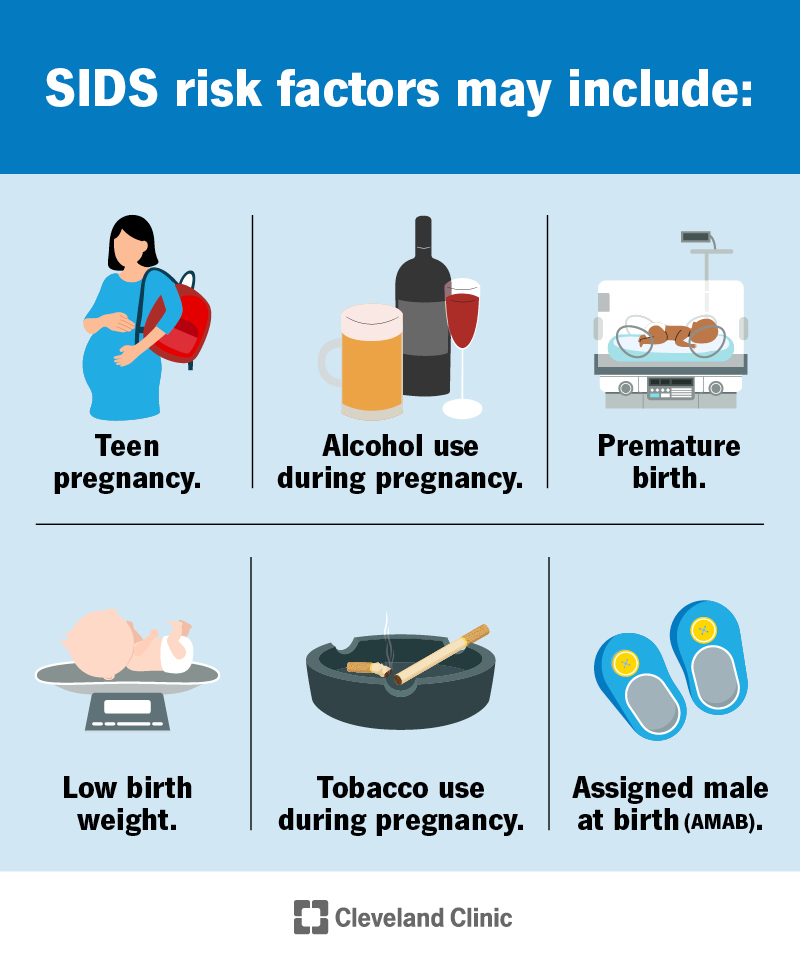SIDS stands for sudden infant death syndrome. SIDS is the sudden and unexplained death of an infant between the ages of 1 month and 1 year old that doesn’t have a known cause, even after a complete investigation. The exact cause of SIDS is unknown, but there are known risk factors and ways to reduce your baby’s chances of dying from the condition.
Advertisement
Cleveland Clinic is a non-profit academic medical center. Advertising on our site helps support our mission. We do not endorse non-Cleveland Clinic products or services. Policy
Sudden infant death syndrome (SIDS) is the term used to describe the sudden and unexplained death of an infant who’s between 1 month and 1 year of age, even after thorough investigation. This investigation includes performing an autopsy, examining the death scene and reviewing the baby’s medical history. If the medical examiner or coroner can’t find a cause for the death and the infant was younger than 1 year old, they’ll call the death SIDS.
Advertisement
Cleveland Clinic is a non-profit academic medical center. Advertising on our site helps support our mission. We do not endorse non-Cleveland Clinic products or services. Policy
Most babies who die of SIDS are between 2 and 4 months old, and 90% are younger than 6 months old. Most of these babies appear to have died during their sleep, usually between the hours of midnight and 6 a.m. This is why other names for SIDS include “crib death” or “cot death.” Cribs don’t cause SIDS, but a baby’s sleep environment can affect sleep-related causes of death. The best way we know to prevent SIDS is placing your baby to sleep on their back.
SIDS isn’t the cause of every sudden infant death. Every year, thousands of infants in the U.S. die suddenly and unexpectedly. Researchers call these deaths SUID, which stands for sudden unexpected infant death. SUID includes all unexpected deaths. It includes those with a clear cause, such as suffocation, and those without a known cause, such as SIDS. One-half of all SUID cases are SIDS.
SIDS is the leading cause of death in babies between 1 month and 1 year old in the United States. About 2,500 infants die every year because of SIDS.

Image content: This image is available to view online.
View image online (https://my.clevelandclinic.org/-/scassets/images/org/health/articles/13646-sids-sudden-infant-death-syndrome)
Almost all deaths that occur due to SIDS happen without any warning signs or symptoms.
Sudden infant death syndrome is, by definition, an unexplained death, so the cause of SIDS is unknown. However, researchers have studied potential SIDS causes to try to better understand how it occurs. The most commonly agreed-upon theory is that babies who die of SIDS have an underlying vulnerability, such as a genetic pattern or a brain abnormality. Then, when they’re exposed to a trigger during early brain or immune system development, that vulnerability causes sudden death. Risk factors for SIDS and this predisposition include:
Advertisement
Researchers believe infants who die of SIDS have issues with the way they regulate their breathing, heart rate and temperature and how they respond to these triggers.
No, vaccines don’t cause SIDS. Although there are reports of babies dying shortly after routine vaccinations, there’s no scientific evidence that childhood vaccinations increase the likelihood of SIDS. In fact, recent research has shown that vaccines may help protect against SIDS.
Other things that don’t cause SIDS include:
No. An infection doesn’t cause SIDS, so it can’t be spread or caught.
Preventing SIDS isn’t always possible, but there are things you can do to reduce your baby’s risk. SIDS prevention starts with keeping your baby’s sleep space safe:
Other ways to prevent SIDS include:
While there’s no way to completely prevent SIDS, one thing you can do to lower your baby’s risk is to make sure they see their healthcare provider for all of their routine well-baby care visits. At these appointments, your baby’s provider will make sure your baby is healthy and developing as expected. Your baby will receive all of their recommended vaccinations. And you’ll have the opportunity to ask any questions you have about keeping your baby safe.
Advertisement
A note from Cleveland Clinic
Losing a baby to SIDS can be overwhelming. You may be feeling anger, sadness, guilt or shock. All feelings are valid. If SIDS has affected you, it’s important to reach out for help and support. Your healthcare provider can help you find resources to guide you through the grieving process. You may find it helpful to join a support group for parents or caregivers who have lost a baby to SIDS. Or you may prefer to talk to a counselor one-on-one. Either way, give yourself time to heal as you cope with this unimaginable loss.
Advertisement

Sign up for our Health Essentials emails for expert guidance on nutrition, fitness, sleep, skin care and more.
Learn more about the Health Library and our editorial process.
Cleveland Clinic’s health articles are based on evidence-backed information and review by medical professionals to ensure accuracy, reliability and up-to-date clinical standards.
Cleveland Clinic’s health articles are based on evidence-backed information and review by medical professionals to ensure accuracy, reliability and up-to-date clinical standards.
Whether you need stitches, a broken bone set or think your appendix might be causing your abdominal pain, Cleveland Clinic’s emergency medicine team is here to help.
